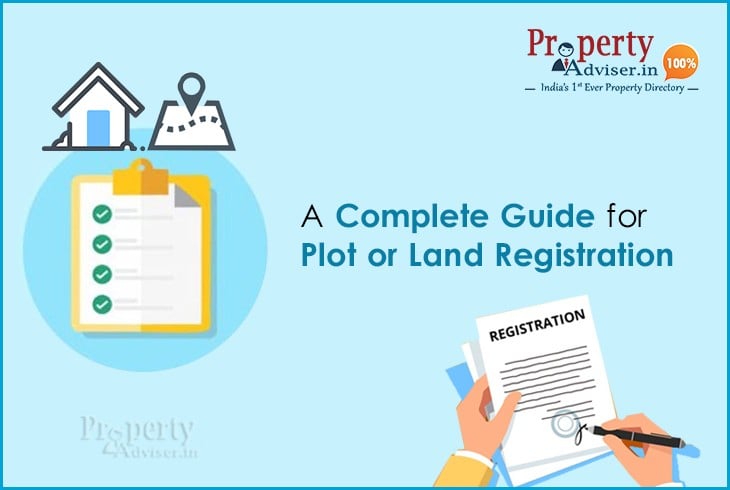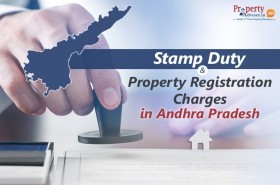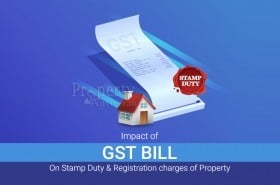Finding a place to build a house for a lifetime is a unique process that each family adapts. The search for the perfect land implies that it has characteristics that fit your needs and your budget. Sometimes the process can become complex by not having the right information or advice to choose the most convenient options. Also, you must take into account all the legal conditions to avoid future disputes. Are you planning to buy a land or plot? Let you know the complete process to buy the property and registration process in the below points.
The property registration refers to the recording of all documents legally as it changes the ownership and other procedures in the transaction of a plot. While buying a land, it is necessary to register all the documents which help in guaranteed legal ownership title to your property. The registration of land protects you from future disputes and frauds and helps you to have an updated public record. However, the land registration process and charges vary from one state to another state. In this process, the transaction is made in the verbal process through the seller and the buyer.
The buyer can visit the site to examine the land and discuss the price of the property. After the oral agreement, both the seller and buyer should have to record the agreement in the form of documentation. The agreement documents have to be made with the assistance of a professional lawyer for secure authenticity. Once the document is done, you need to pay the stamp duty depending on the state. Next, execute your sale agreement and register the same in the Sub-registrar of assurance’s office by submitting all the related documents. Finally, the mutation of the property done in revenue records by visiting the local municipal authorities.
Apartments in Hyderabad starts from 15 Lakhs
Plots in Hyderabad below 5 Lakhs
Villas in Hyderabad below 80 Lakhs
Keys to Choosing a Plot
Location: proximity to access means of transport, schools, shopping centres, etc.
Necessary Services: If you have drinking water, electricity, sewage and gas.
Construction Aspects: Type of soil and technical aspects governed by the General Law of Urban Planning and Construction and according to the ordinances of the community regulatory plans.
Monthly Expenses: The value of taxes, common expenses and, if applicable, of expenses.
Legal Status: Report of ownership, inhibition of owners and that is free of debts.
To build a home in spacious land, you have to consider the property is situated in a correct location with comfortable facilities. It is more beneficial to avoid the purchase of the property does not meet your needs. It is essential to identify that the property does not have liens or pending mortgages, since ignoring this can lead to complications in the future. Since in some areas it is necessary to process special permits to build, it is recommended to investigate in advance if there is any problem for this purpose.
It is key to know the land registration situation and its urban reality to avoid fraud. You have to go to the Property Registry to request a simple note, verify the identity of the seller and confirm that the property has no restrictions. Especially if you want to build a home, make sure that the area has all the essential services at your fingertips, such as street lighting, sewerage, green spaces, etc.
However, experts suggest that before buying land, make sure that you have to know the proper due diligence of property and its title, whether it is agricultural land or land that is used for other commercial purposes or to construct a building of your own. Also, it is advised to buy a plot through a professional adviser that will help to acquire the best plot, and you can register the property with ease without any difficulties.
To secure the transaction of a plot, Registration Act 1908 has introduced in India with many rules. The land laws help to remove all the disputes that occurred due to fraudulent transactions. The online registration process helps the government and the municipal authorities to levy appropriate taxes on such lands to get revenues and use in the development of the country.
It also helps the government officials to keep the up to date land records and prepare a land-use map. Additionally, in case your land is registered, you are entitled to receive compensation on submission of land to the government or third party companies who are interested in executing infrastructure projects.
What is the Procedure for Plot Registration?
As per the provision of the Indian Registration Act, 1908 the property registration is one of the important aspects in the real estate transactions. The transfer of properties has to be recorded to get the rights of the property on the execution date of the documentation. Look at the procedure for land registration in detail from the below points. While buying a plot, there are too many things involved in the process. Before going into the plot registration process, there are a few things you must know are as follows.
Registration Charge
The buyer pays the registration fee to the state government as a small percentage of the total cost of the plot for registering the property in his name.
Stamp Duty
During the submission of the documents, the buyer pays the stamp duty in a small percentage of the total plot cost to declare that the presented certificates are original.
Property Price
It is the minimum cost of the land estimated by the state government. Stamp duty is 4% of the saleable value of the plot. The registration fee is 0.5% of the saleable value. The saleable value of a property is the product of the property size and the guideline value. The women and senior citizens get a discount on registration fee and stamp duty charges in some states.
For Example -
The price of a plot in Hyderabad in a specific area is Rs.4,000 per sq.ft. This means that any plot sold in a particular area cannot be sold for less than Rs.4,000.
Let us say that Mr Ganesh purchased 1000 square feet property in Hyderabad at Rs.4,000 per sq.ft.
The guidance value for the property is Rs.40,00,000 (Rs.4,000 times 1000).
The stamp duty for the property (assume it is a municipal property) is Rs.1,60,000 ( 4% of the market value Rs.40,00,000)
Registration Charges for the property is Rs.20,000 ( 0.5% of saleable value Rs.40,00,000) .
The total registration and stamp charges are Rs.1,80,000 (Rs.1,60,000 + Rs.20,000).
Therefore, Mr Ganesh has to pay a total of Rs.41,80,000 (Rs.40,00,000 + Rs.1,80,000) to own the property.
Apart from the total cost of your plot, the registration fees and stamp duty charges are affected by several factors as follows.
Property Type
To buy land or property if it is old or new, there will be an effect on its registration fees and stamp duty charge. As the charges of a new property will certainly be more compared to an older property. The charges vary depending upon the use of the property such as residential or commercial properties. Hence, registration for commercial land is more than residential property.
Area of the Property
The area of the land has a great impact on the registration fees and stamp duty charges. The charges vary from one state to other, and they also differ under the neighbouring area being urban or rural. Generally, urban communities will have a higher registration fee.
Property Transfer
The registration fee will differ based on the property transfer type. If the property is transferred by another person or unrelated person or by your family member as a ‘Gift’. It will be higher for the former as compared to the latter.
Documents Needed For Plot Registration
As per the state government to buy and register a plot legally few required documents are submitted for the assured transaction. The documents include
- Sale deed in existing seller’s name
- Katha certificate
- Receipt of latest tax payment
- Encumbrance Certificate
- Agreement of sale
- All title documents of the landowner
- All registered previous agreement copies (in case of resale property)
- Power of attorneys if any
Guidelines for Land or Plot Registration Process
Examining Details for Safety Assurance
This process takes approximately 5 to 7 days and costs about 10,000 rupees. The documents are thoroughly checked to ensure that there are no loans or due bills as on the date of purchase for the buyer’s safe transactions. The seller must agree to sell the property, and the ownership document must be in the name of the owner, which is issued by the revenue record department.
Final Document Preparation
The buyer has to appoint a professional lawyer for secure transactions. The preparation of the final document is prepared by the designated professional lawyer of the buyer on green legal paper. It is done with the date and place and sent for stamping to prepare final documentation.
Refund of Stamp Duty
The buyer pays the stamp duty at the selected bank, and this process completes in one day. The bank issues a receipt with marking stamp duty received in the front page of the sale deed.
Closing Execution
The final execution is done with signing the sale deed at sub-registrar office by the buyer, seller and two witnesses. The distinct number is generated for documentation, and you have to pay the registration fee in the form of cash or DD. Following all the formalities, the documentation is delivered to the buyer. You can take the help of an agent at the sub-registrar office to speed up the process.
The document includes two passport size photographs, ID proof of the buyer, seller and the two witnesses, PAN cards and Certified exact copies of Certificate of Incorporation of the seller, a buyer, Copy of the latest property register card to assure no government ownership of the plot, and municipal tax bill to identify the year in which the property was constructed.
Change in the Ownership
This is the more complicated process and must be done with the assistance of a professional lawyer. After registration, the buyer needs to change the title of the property to his name to enable himself as the owner and taxpayer for the property. For this change, you need to apply the mutation, an affidavit and a copy of the final sale deed in the registrar office. After the request submission, the tax on the property is calculated, and the letter of mutation is issued for the buyer.
To assist the people in the process of registration, the government introduced an online service that acts as a search engine for the process of registration and document submission. It is an application of the Department of Stamps & Registration. It provides the people to find the list of documents for registration at one place. A buyer can also book a registration date using this website.
Benefits of Property Registration
The advantages of registering the property deed are as follows.
- Assure the genuineness of the deed.
- To guarantee the elusion of frauds, conservation of evidence, the transfer of title to the owner.
- Allow publicity for transactions.
- Maintaining an up to date public record by registering a property.
- Give the facility to determine whether the property has already been sold.
- Creates security to title deeds and prove titles in case the original deeds are lost or destroyed.
Explore detailed information on plotting projects in prominent areas of Hyderabad. Select the best plot from more than 200+ plotting projects for sale in Hyderabad that suit your budget and lifestyle. Pave the easy way to lead a happy lifestyle.
By: Shailaja K















